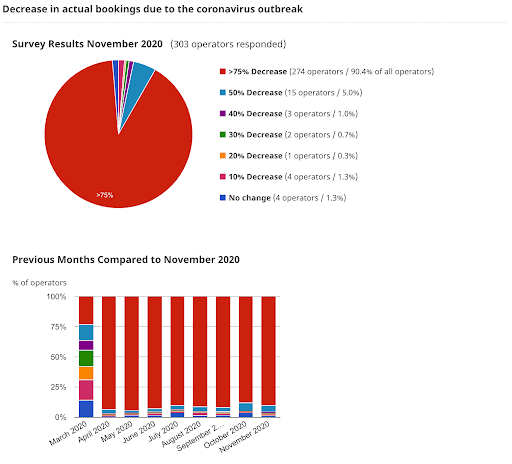By Atlanta Mahanta
SafariBookings.com has just conducted its eighth monthly survey among 294 tour operators on the African safari industry. The study carried out a detailed review and subsequent decrease of the foreign number of visitor arrivals of the coronavirus pandemic in the protection and health field.
Many tour operators endured a troubling loss of at least 75% of bookings, which for most companies is unsustainable in the long run. This is in conjunction with the seven preceding surveys, with just a very slight change in both the surveys and the reservations obtained from operators differentiating this sample.
“The coronaviral impact in Tanzania was devastating,” one operator stated . So many people are employed in the tourism industry in this region. Most safari businesses, if not all, do not have a company. It’s a really unfortunate condition when workers do not afford their rent or purchase food.”

“Coronaviruses have affected over 80% of our safari business in Tanzania and other industries that depend on tourism,” Having said this, we expect that in the coming season life can return to usual.”
Altogether, 90 percent of the operators reported that they had missed at least three quarters of their reservations normally at the moment. “All bookings for 2020 have been postponed to 2021,” a Namibian operator summarised. No new bookings have been obtained by us for the year 2021.” “Actually, we have no confirmed reservations,” said Kenyan operator.
Nearly 70% of the operators participating in our most recent survey reported that cancellations of current reservations had jumped by at least 75%. Overall, fewer than 10% of operators indicated they were operating as normal. “Cancellation and reschedule bookings are now the only emails we receive, no new applications at all a Ugandan operator stated.
The tourism limits for Kenya, Tanzania, Uganda, Rwanda and Namibia have been reopened. These safari countries, with the exception of Tanzania, need confirmation of a negative COVID 19 PCR test within a few days of being flying. Rwanda, Uganda and Namibia need more checking on arrival – a few days before arrival or before departure.
South Africa has also opened up, but not to high-risk nations like the United States and several of the countries in Europe. This South African operator reflected several related remarks: “The boundaries of South Africa have reopened, but 60 countries are still not permitted to participate. These provide major markets with outlets such as the United States and the UK. So for a bit it will always be difficult. Hopefully in October for transition.
Many operators claim a vaccination was the answer to a comeback to work for the sector, as this US based operator said It looked like things had started improving in August and September, but people now seem to be rethinking plans for the second wave in Europe and the US. It seems like unless there is a workable vaccination, we can’t anticipate any recovery.
This remark from an operator in Kenya was momentarily and sharply summarising the durability and determination still found in the safari industry considering the major setbacks of the year 2020.
Data source: Safari Agencies
